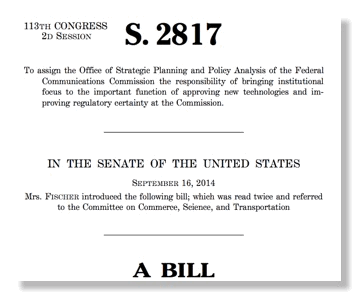Sen. Fischer Introduces S. 2817 to Urge FCC Compliance with Section 7

Section 7, passed over 30 years ago is brief:
(a) It shall be the policy of the United States to encourage the provision of new technologies and services to the public. Any person or party (other than the Commission) who opposes a new technology or service proposed to be permitted under this chapter shall have the burden to demonstrate that such proposal is inconsistent with the public interest.
(b) The Commission shall determine whether any new technology or service proposed in a petition or application is in the public interest within one year after such petition or application is filed. If the Commission initiates its own proceeding for a new technology or service, such proceeding shall be completed within 12 months after it is initiated.
It basically puts the burden of proof on those who oppose new technology and sets a schedule for deliberations on new technology, FCC has consistently ignored both provisions.
Sen. Fischer’s bill assigns 2 new functions to the FCC Office of Strategic Planning and Policy Analysis
(A) take steps to ensure that the Commission complies with each deadline under subsection (b) (of section 7);
(B) review each regulation proposed by the Commission and analyze the impact of the regulation on innovation, economic growth, andjob creation;
Now in a well functioning agency this congressional tinkering wouldn’t be needed. But there is something in the FCC’s hidebound culture under both parties that has resulted in a 30 year consistent avoidance of Section 7.
Let’s not be naive: a junior senator from the minority party in the Senate without cosponsors is not going to change FCC’s long habit of ignoring this provision of its statute. But maybe she will get more attention than an obscure spectrum blogger! Maybe she can get FCC to explain why it continues to ignore this part of its statute?
Section 7 is not a perfect piece of legislation as presently written. But if FCC doesn’t like it, why hasn’t it proposed any changes in 30 years?




![Validate my RSS feed [Valid RSS]](valid-rss-rogers.png)

